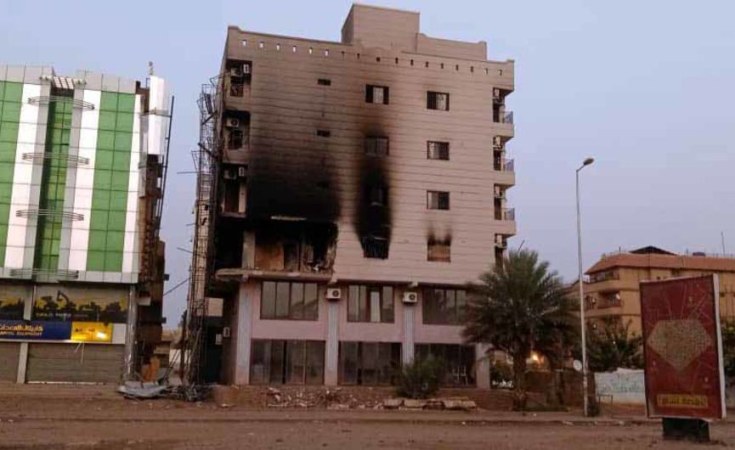Geneva — Millions of Sudanese face acute hunger, increased health risks, and death from recoverable injuries because United Nations agencies have been forced to suspend their lifesaving activities in Sudan, where fighting has it made it too dangerous for them to operate.
Sudan and its neighbors had suffered decades of deprivation, hardship and conflict. Before fighting broke out between the Sudanese army and paramilitary Rapid Response Forces two weeks ago, Sudan already hosted more than 4 million forcibly displaced people.
Heavy fighting and insecurity have driven tens of thousands to flee in search of safety and protection, with many people scattered throughout the country and in neighboring states.
"It is very, very worrying," said Axel Bisschop, U.N. refugee agency representative in Sudan. "It has already caused a devastating impact on the population, including refugees and all displaced people who already are on the margins of society."
Bisschop said some areas are worse off than others and the UNHCR has had to temporarily pause most aid programs in Khartoum, the Darfurs, and North Kordofan because of dangers to its staff.
"The biggest challenge we have is Darfur" because it has already faced significant intercommunal conflict and displacement, he said, speaking by phone from Port Sudan.
"Now with this added crisis, the situation will be very, very difficult," he said. "We also are concerned that intercommunal violence is going to increase and that we might have some situations, which will repeat in relation to what we had a couple of years ago."
That is a reference to tribal clashes that erupted in Sudan's West Darfur in April 2021. The U.N. office for the coordination of humanitarian affairs, OCHA, said that violence killed 56 people, injured scores of others, and sent thousands fleeing for their lives into neighboring Chad.
Given the constraints on its ability to assist the many people in desperate need, Bisschop said the UNHCR was working closely with the World Food Program, UNICEF and other U.N. and non-governmental agencies to provide basic aid, especially for the newly displaced.
WFP suspends operations
While the will is there, the ability to operate under present conditions remains extremely limited.
The WFP said security concerns have forced it to temporarily suspend its humanitarian operations in Sudan, where one third of the population -- around 15 million people -- face hunger.
Before the eruption of violence, the WFP had planned to assist 7.6 million Sudanese this year. But those plans have been shelved because the environment is too insecure.
The Sudanese Ministry of Health says 512 people have been killed, a figure U.N. agencies believe is grossly underestimated. The World Health Organization has also verified 25 attacks on health care facilities causing the death of eight people and injuring 18 others.
Brenda Kariuki, the WFP senior regional communication officer in Eastern Africa, said humanitarian operations in the country were virtually impossible, given the intensity of the fighting in many parts of the country.
"As the fighting rages on in parts of Sudan...at a time when a third of the country is in desperate need of assistance," she said, "we are hearing of acute shortages of food, water, fuel, medicines and access to health care. With this crisis, we are afraid that millions more will plunge into hunger."
Thousands flee
Thousands of Sudanese and South Sudanese refugees have fled to neighboring countries to escape the escalating violence in Sudan.
The United Nations reports some 20,000 people have fled to Chad and at least 4,000 South Sudanese refugees have arrived in five northern states bordering Sudan in hopes of returning to their homes of origin.
The WFP said those numbers are expected to increase as the crisis escalates. It warns that the consequences, which will be severe and long term, already are being felt.
The agency says that the cost of a food basket already has risen by up to 28 percent across South Sudan's northern border states since the outbreak of fighting and that "this will further push people into hunger and increase needs in South Sudan."
Kariuki adds the WFP will be unable to provide aid to needy people inside Sudan while the current situation of insecurity persists.
"WFP's staff, offices and vehicles and equipment and food stocks have come in the direct line of fire and looting of our warehouses continues," she said. "To date, we know up to 4,000 metric tons of food meant for vulnerable people has been looted from our warehouses and at least 10 vehicles and six trucks, which transport food, have been stolen."
She calls that unacceptable "as it takes away humanitarian aid meant for the most vulnerable Sudanese and refugees who desperately need this lifesaving food."
Children deprived of aid
Among those who will be deprived of essential aid, she said, are the hundreds of thousands of refugees sheltering in Sudan, schoolchildren who will miss their daily meal, malnourished infants, many at risk of dying without treatment, and pregnant and breastfeeding mothers.
U.N. agencies are appealing to the warring parties to take immediate steps to stop the fighting and enable humanitarian workers to safely carry out their lifesaving operations.


